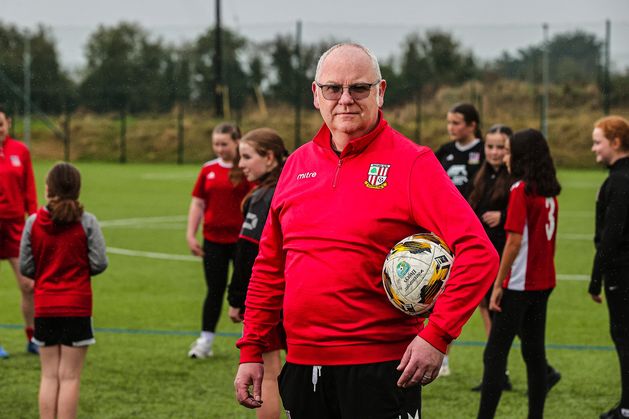Nine teams left without a league as coaches fear girls will turn away from sport and lose a vital mental health resource
Friendships were formed on and off the pitch and she, along with her teammates, turned up to training in all types of weather.
Now she is one of 400 players across 27 girls’ teams in north Dublin and east Meath left without league football this season.
It follows the collapse of the Dublin Metropolitan Girls’ League (MGL) over the last two years, which had been run by the North Dublin Schoolboys/ Schoolgirls League (NDSL).
The majority of the former MGL teams transferred to the Dublin District Schoolboys/Schoolgirls League (DDSL), but the remaining MGL teams only found out they had insufficient teams to form leagues this season after a DDSL club transfer deadline of August 20 had passed.
The clubs include Balrath, Laytown and East Meath United as well as Dublin teams such as Tyrrelstown and Rush.
Ava, who plays under-16s for East Meath United, said the girls feel “neglected” with most now leaving to go to other clubs.
“It’s very hard to describe how we are feeling. We are feeling neglected. We come together to play as a team and we want to carry on as a team.
“Realistically, if we can’t play matches, some are thinking of leaving to other clubs. I’d ask the DDSL and the FAI to think again and just let us kick a football.”
East Meath Utd coach Emmet McDonald said it was disgraceful that girls were being excluded from playing sport through no fault of their own.
“These girls even help out with the younger players. They should be rewarded, not punished. It’s critical to keep them in sport.”
Amy Cleary, who plays under-16s for Balrath Girls and Boys FC in Meath, said the girls have lost their motivation to play. “It is unfair that we don’t have a competition to take part in,” she said.
Numbers at training have fallen off because some of the girls have just lost the motivation. What’s the point of being a team if we don’t get a chance to play as a team?”
Balrath coach Dave Hewitt said they fear the girls may not be able to play a competitive match until next September.
“So over 400 girls can’t play kids’ football because of a technicality and there is nowhere else to go, so it could be next September before we can join another league and play matches.
“All the coaches involved are trying their best to arrange friendlies but we need a league to play in.
“I’ve lost four players already and the longer this goes on, the more I will lose. Some girls have decided to only concentrate on GAA now.”
He added that many of the girls were at an age where they were studying for exams, and sport is an important outlet for them in terms of mental health and getting outdoors.
“We had one girl who was in the national academy and we had to let her go to another club so she could play matches in a different league. It’s hard to keep the girls motivated at a time when the FAI has launched its ‘In Her Boots’ initiative to keep girls playing soccer – how ironic is that?
“In my opinion, the forgotten nine (the nine clubs involved) have been totally ignored by both the SFAI and the DDSL and we have had no communication from them at all.
“These girls need soccer for their own development and their mental health. I’m going to fight for these kids.”
The issue was raised by Sports Minister and Meath East TD Thomas Byrne, who has met with the FAI on a number of occasions to get the issue resolved.
“This is one issue which has brought the Government and the opposition together and that is the girls’ access to the DDSL League and I hope the message goes out that Dáil Éireann is united in that every girl deserves to participate and people in committees shouldn’t be deciding that some girls’ teams can’t go into a league which other clubs in the area belong to,” he told the Dáil.
The FAI and the SFAI were approached for comment.
In a statement, chairperson of the DDSL, Niall O’Driscoll, said member clubs “make every effort to offer every opportunity for any young girl in the capital to play”.
“The DDSL through its 143 clubs in membership provides football for almost 12,000 girls, over 750 teams ranging from under-7s to under-18s in the current season.
“We are disappointed that the same offering to girls is not offered by many leagues and clubs outside the capital and needs to be addressed by all concerned and especially the supports needed for voluntary sports organisations to deliver such opportunities for the female game that they fully deserve in every aspect.”

